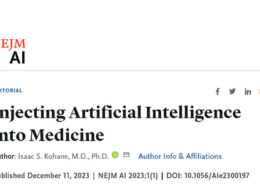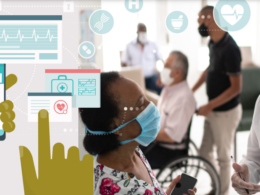the health
transformation
knowledge portal
Joaquim Cardoso MSc
Founder and Chief Researcher, Editor & Strategist
April 2, 2024
What is the message?
The integration of Artificial Intelligence (AI) in healthcare holds tremendous potential for transforming the industry by improving diagnoses, personalizing patient support, accelerating drug discovery, and enhancing overall efficiency.
However, significant barriers hinder the widespread adoption and realization of these benefits.

This summary is based on the article “The AI doctor will see you…eventually”, published by The Economist on March 30, 2024.
What are the key points?
Promise of AI in Healthcare:
AI offers opportunities such as smart diagnostics, personalized care, and improved treatment outcomes.
Analysts predict substantial cost savings and potential to save lives, with estimates suggesting annual savings of $200-360 billion in the US healthcare system alone.
Examples include smart stethoscopes, robot surgeons, and AI-driven analysis of large datasets for disease tracking and treatment recommendations.
Barriers to Integration:
Fragmented and regulated health data limits the training and effectiveness of AI systems.
Slow regulatory approval processes and lack of governance hinder innovation and adoption.
Incentive structures within healthcare systems prioritize volume over efficiency, posing challenges for cost-saving innovations like AI.
Addressing Challenges:
Solutions involve improving data accessibility, enhancing regulatory capacity, and incentivizing AI adoption through funding and policy support.
Collaboration among countries to establish global standards and facilitate innovation.
Companies must prioritize safety, reliability, and accountability in AI products.
What are the key statistics?
Analysts predict that deploying AI could save hundreds of thousands of lives annually in Europe and reduce $200-360 billion in annual medical spending in the US.
Roughly 800,000 Americans suffer from poor medical decision-making annually.
Administration accounts for about 30% of excess healthcare costs in the US.
What are the key examples?
Wearable devices and AI-powered portable ultrasound devices showcase the potential for AI-driven innovations to benefit healthcare.
Instances of AI tools being used for smart diagnostics and personalized patient care demonstrate the practical applications of AI in healthcare.
Conclusion
While formidable obstacles hinder the widespread integration of AI in healthcare, the potential benefits are vast.
Governments, regulators, and companies must collaborate to overcome these challenges and unlock the transformative power of AI in healthcare, setting a precedent for its adoption in other fields.
To read the original publication, click here.











